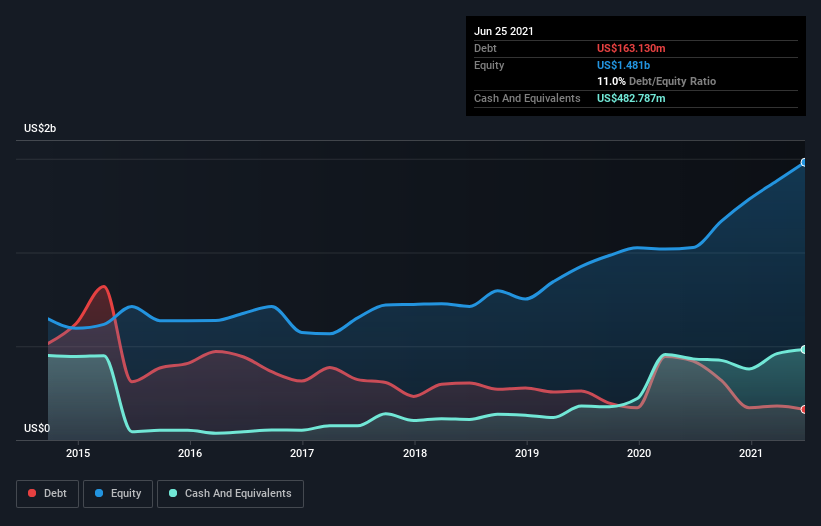Is Graco (NYSE:GGG) A Risky Investment?
Some say volatility, rather than debt, is the best way to think about risk as an investor, but Warren Buffett famously said that 'Volatility is far from synonymous with risk.' It's only natural to consider a company's balance sheet when you examine how risky it is, since debt is often involved when a business collapses. Importantly, Graco Inc. (NYSE:GGG) does carry debt. But the real question is whether this debt is making the company risky.
What Risk Does Debt Bring?
Debt assists a business until the business has trouble paying it off, either with new capital or with free cash flow. If things get really bad, the lenders can take control of the business. However, a more usual (but still expensive) situation is where a company must dilute shareholders at a cheap share price simply to get debt under control. Of course, debt can be an important tool in businesses, particularly capital heavy businesses. The first step when considering a company's debt levels is to consider its cash and debt together.
See our latest analysis for Graco
What Is Graco's Debt?
The image below, which you can click on for greater detail, shows that Graco had debt of US$163.1m at the end of June 2021, a reduction from US$420.6m over a year. But it also has US$482.8m in cash to offset that, meaning it has US$319.7m net cash.
How Healthy Is Graco's Balance Sheet?
The latest balance sheet data shows that Graco had liabilities of US$358.7m due within a year, and liabilities of US$389.2m falling due after that. On the other hand, it had cash of US$482.8m and US$354.2m worth of receivables due within a year. So it actually has US$89.1m more liquid assets than total liabilities.
This state of affairs indicates that Graco's balance sheet looks quite solid, as its total liabilities are just about equal to its liquid assets. So while it's hard to imagine that the US$13.2b company is struggling for cash, we still think it's worth monitoring its balance sheet. Simply put, the fact that Graco has more cash than debt is arguably a good indication that it can manage its debt safely.
On top of that, Graco grew its EBIT by 39% over the last twelve months, and that growth will make it easier to handle its debt. There's no doubt that we learn most about debt from the balance sheet. But ultimately the future profitability of the business will decide if Graco can strengthen its balance sheet over time. So if you're focused on the future you can check out this free report showing analyst profit forecasts.
Finally, while the tax-man may adore accounting profits, lenders only accept cold hard cash. Graco may have net cash on the balance sheet, but it is still interesting to look at how well the business converts its earnings before interest and tax (EBIT) to free cash flow, because that will influence both its need for, and its capacity to manage debt. During the last three years, Graco produced sturdy free cash flow equating to 73% of its EBIT, about what we'd expect. This free cash flow puts the company in a good position to pay down debt, when appropriate.
Summing up
While we empathize with investors who find debt concerning, you should keep in mind that Graco has net cash of US$319.7m, as well as more liquid assets than liabilities. And we liked the look of last year's 39% year-on-year EBIT growth. So is Graco's debt a risk? It doesn't seem so to us. We'd be very excited to see if Graco insiders have been snapping up shares. If you are too, then click on this link right now to take a (free) peek at our list of reported insider transactions.
Of course, if you're the type of investor who prefers buying stocks without the burden of debt, then don't hesitate to discover our exclusive list of net cash growth stocks, today.
This article by Simply Wall St is general in nature. It does not constitute a recommendation to buy or sell any stock, and does not take account of your objectives, or your financial situation. We aim to bring you long-term focused analysis driven by fundamental data. Note that our analysis may not factor in the latest price-sensitive company announcements or qualitative material. Simply Wall St has no position in any stocks mentioned.
Have feedback on this article? Concerned about the content? Get in touch with us directly. Alternatively, email editorial-team (at) simplywallst.com.

